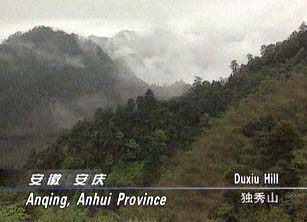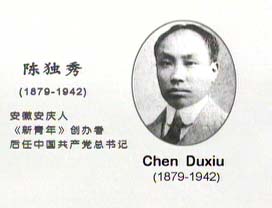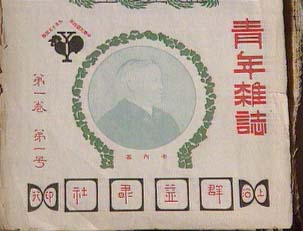 |
|
Adolescent China (2)
“New Youth” |
| CCTV.COM 2002-10-30 15:10:30 |
|
 A hill stands more than 20 kilometres southwest of Anqing City. A hill stands more than 20 kilometres southwest of Anqing City.
“It looks like a vertical pen from the west.
It looks like an inverted pot from the north.
It is the highest hill in the county.
So it is called Duxiu (Singularly Beautiful).”
From Annals of Huaining County
A description of the name of the hill can be found from the Annals of Huaining County. In 1879, a baby was born at Beiguan, Anqing City. He was Chen Duxiu.
In those days, Anqing was an important city along the Yangtze River. It was here that Chen Duxiu spent his days of early youth. Like other traditional intellectuals, Chen Duxiu received elementary education from the Four Books and the Five Classics.
 His grandfather spared no pains for him, but the rigid way of education often set Chen Duxiu against his stern grandfather. His grandfather spared no pains for him, but the rigid way of education often set Chen Duxiu against his stern grandfather.
However, he had to yield to his tearful mother. Later in his autobiography, Chen Duxiu recalled his experiences in his early years.
“My grandfather and my mother did not expect that I would become a follower of Kang Youwei, a rebel and a communist that scared them out of their wits, instead of a provincial graduate, a palace graduate and the Number One Scholar.”
From Chen Duxiu’s Autobiography
In 1896, 17-year-old Chen Duxiu passed the imperial examination at the county level. In Nanjing a year later, he failed the imperial examination at the provincial level.
In 1900, 21-year-old Chen Duxiu left his hometown and came to Shanghai. He never returned to his hometown for more than 40 years, but he was buried in his hometown after he died.
In 1901, Chen Duxiu crossed the sea eastward and arrived in Japan. In those days, Japan was the base camp of the Reform Movement. There he began to take democratic ideas from the Western countries.
 Chen Duxiu returned to China from Japan in June, 1915. For three months after that, he bustled about everywhere to fulfil his ideal which seemed to be very simple in those days, that is, to publish a magazine. Chen Duxiu returned to China from Japan in June, 1915. For three months after that, he bustled about everywhere to fulfil his ideal which seemed to be very simple in those days, that is, to publish a magazine.
The first issue of the magazine was born on September 15, 1915. Chen Duxiu named it "Youth Magazine". A year later, he renamed it "New Youth". Like a rainbow arching across the sky, the magazine became a post of strategic importance in the realm of ideology.
"The rise of anything and the subtlety of any matter hinge on scientific laws. If they want to break away from the age of barbarism, our fellow countrymen should lay equal stress on science and human rights."
-- Introduction to "New Youth"
Democracy and science became Chen Duxiu's ideological weapons. The two words were used most frequently in the following ten years and more.
In Hunan Province, the “New Youth” was read eagerly by Mao Zedong, a student of the Hunan Provincial No. One Normal School. Later he recalled that he appreciated articles written by Chen Duxiu and Hu Shi for the “New Youth”. He said they once replaced Liang Qichao and Kang Youwei as the examples he followed.
 In Sichuan, Zhu De, a brigade commander of the Republic Pacification Army, saw copies of the radical magazine “New Youth” from a friend of his. Soon afterwards, he gave up his abundant life with a monthly pay of 2,000 silver dollars. He decided to go abroad to seek the truth. In Sichuan, Zhu De, a brigade commander of the Republic Pacification Army, saw copies of the radical magazine “New Youth” from a friend of his. Soon afterwards, he gave up his abundant life with a monthly pay of 2,000 silver dollars. He decided to go abroad to seek the truth.
The “New Youth” became a position for many young people to obtain theoretical nourishment. Under the banners of democracy and science, the traditional ethics represented by Confucianism became the target of attack from the “New Youth”.
For two thousand years, almost nobody had questioned the status of Confucius. But Wu Yu sharply criticized the doctrine of Confucius. Promoted by Wu Yu, Hu Shi, Lu Xun and others, the Enlightenment Movement against traditions evoked strong repercussions from all sectors of society.
In the winter of 1916, Chen Duxiu came to Beijing to raise money for his magazine. Six issues of the “New Youth” had been published, drawing attention from the realm of ideology in Beijing. Cai Yuanpei, who was planning reforms in Beijing University, had his first meeting with Chen Duxiu in this small old hotel. That was a historic shaking of hands. The union of a university and a publication would usher in a cultural and ideological movement with a far-reaching influence.
|
|
Editor: Liu Baoyin CCTV.com
|
|
|
|
|
|
 |









